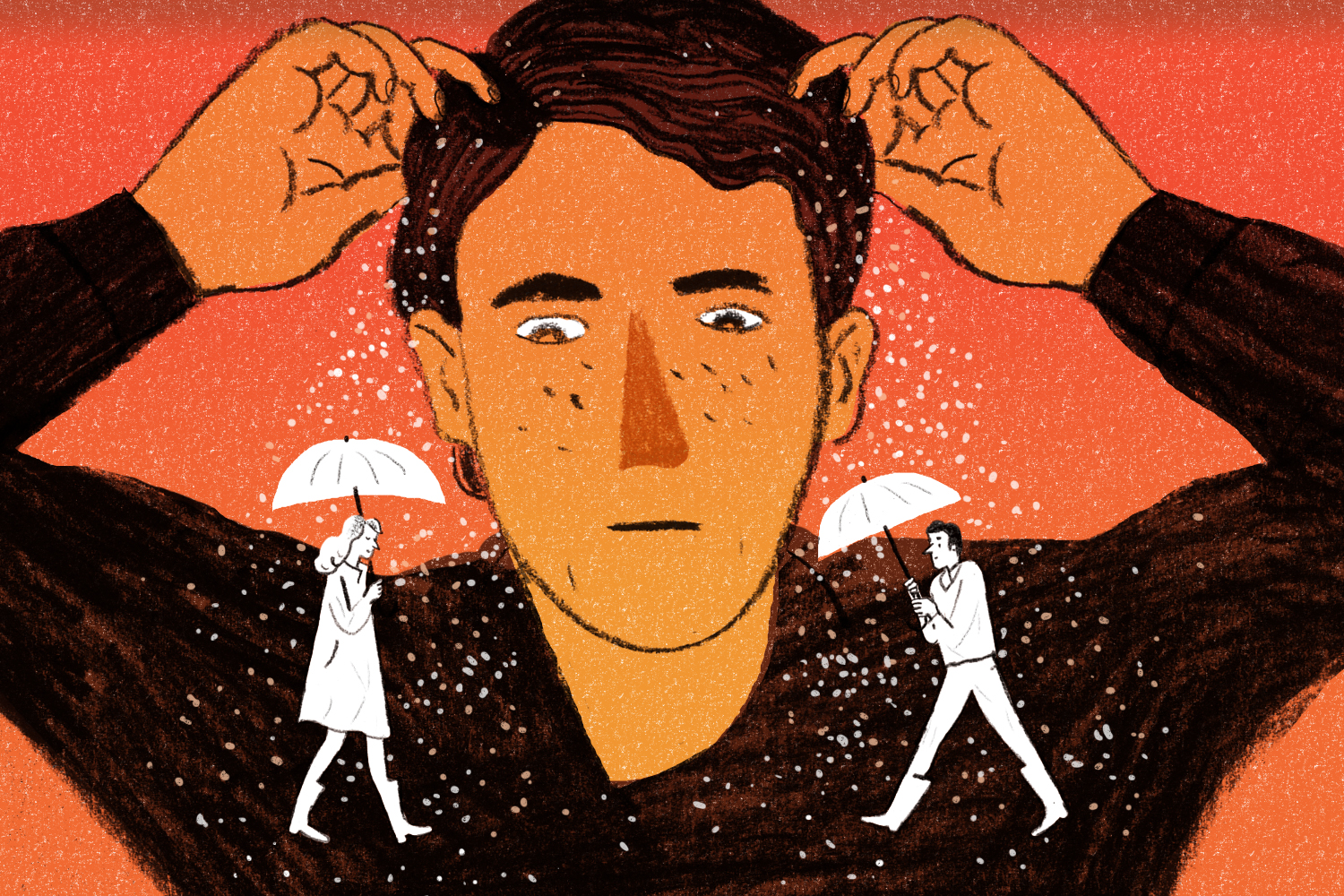
Itches are inscrutable. They arrive unannounced and recede at the rake of a fingernail. But the stubborn kind—the type that skittle across your scalp with terrible regularity—tend to have an easily identifiable cause: Dandruff.
“People think dandruff has to do with dry skin, but it’s actually a problem with how the skin cells on your scalp turn over or replace themselves,” says Dr. Adam Friedman, director of dermatologic research at the Albert Einstein College of Medicine in New York. Your skin is constantly shedding layers of cells while manufacturing new ones, and Friedman says this process can be touchy. “Producing too many cells too quickly can lead to a build-up of dead skin, and this build-up itches and flakes off,” he explains. “That’s dandruff.”
What causes this over-production of skin cells? Anything that puts stress on your immune system—from cold winter temperatures to a crazy week at the office—can switch on certain genetic proteins that speed up the production of skin cells, Friedman says. (Other skin conditions—acne, eczema—also flare up when you’re stressed.)
Yeast microorganisms living on your scalp can also mess with your skin’s cell reproduction, says Dr. Anthony Rossi, a dermatologist with Memorial Sloan Kettering Cancer Center. While usually harmless, these organisms—which live on everyone’s skin—can cause a reaction in some that leads to cell overabundance.
How do you stop the itching and flaking? Dandruff shampoo is a good start. Friedman says these shampoos work by killing scalp microorganisms and turning off the proteins that cause your skin cells to go nuts. That said, shampoos only help if you use them properly. “You’re trying to treat your scalp, so working these into your hair doesn’t do much good,” Friedman says. “You need to massage these products onto your scalp skin and leave them there for a couple minutes before rinsing.” (They aren’t usually very kind to your hair, though.)
He says dandruff shampoos typically include any one of a small number of chemicals that are all pretty much equally effective. While you could wash with them every day without over-drying your scalp, Friedman says this isn’t necessary. “Two or three times a week is plenty,” he says. “And if you don’t see improvement after a few weeks, switching to another product or using them more probably won’t do any good.”
You Asked: Your Top 10 Health Questions Answered










There are many more explanations for an itchy dome. If your scalp is inflamed, red, and itchy, that may be seborrheic dermatitis—a more severe form of dandruff. “Scalp psoriasis is probably the next most common,” Friedman says. It can be hard to tell the difference between the two. But usually the flakes or “plates” of silvery gray plaques associated with scalp psoriasis are larger than dandruff flakes and tougher to brush from your clothing, he says. Scalp psoriasis could also cause some ear or face flaking.
Friedman mentions a few less-common issues: a skin disease called discoid lupus, or an allergic reaction. Rossi says an irritation to hair products like sprays or pomades is another possible itch-instigators. But trying to distinguish between those things and dandruff is really tough, Friedman says.
A good rule of thumb: If you have a red, itchy head and dandruff shampoos aren’t working after a month, see a doctor, he advises. He also cautions against waiting too long if dandruff shampoos don’t get the job done. “If you don’t treat inflammation of the scalp, there’s a chance of skin damage or hair loss,” Friedman says. “There’s often no coming back from that once it happens.”
More Must-Reads from TIME
- Cybersecurity Experts Are Sounding the Alarm on DOGE
- Meet the 2025 Women of the Year
- The Harsh Truth About Disability Inclusion
- Why Do More Young Adults Have Cancer?
- Colman Domingo Leads With Radical Love
- How to Get Better at Doing Things Alone
- Michelle Zauner Stares Down the Darkness
Contact us at letters@time.com